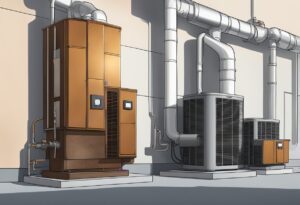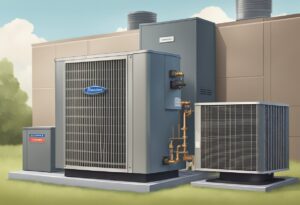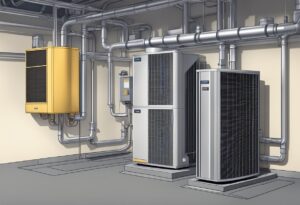When it comes to heating, ventilation, and air conditioning (HVAC) systems, age matters. Older HVAC systems may still function, but they may not be as efficient as newer models. In fact, they may even be costing homeowners more money in energy bills than necessary. This article will explore the differences between old and new HVAC systems and why age matters.

Older HVAC systems were built to last, but they were not built with energy efficiency in mind. Newer models, on the other hand, are designed to be more energy-efficient, which translates to lower energy bills for homeowners. In addition, newer HVAC systems often come with advanced features, such as programmable thermostats and smart home integration, that make them even more convenient to use. By contrast, older systems may require manual adjustments and lack the advanced features that homeowners have come to expect.
The Importance of HVAC System Age

The age of an HVAC system can have a significant impact on its performance, efficiency, and reliability. In this section, we will explore the importance of HVAC system age and how it can affect various aspects of your indoor environment.
Impact on Efficiency
Older HVAC systems tend to be less efficient than their newer counterparts. This is because they were designed using outdated technology and may not meet current energy efficiency standards. As a result, they require more energy to operate, which can lead to higher utility bills and increased carbon emissions.
In contrast, newer HVAC systems are designed with energy efficiency in mind. They use advanced technology and are built to meet strict energy efficiency standards, which can help reduce your energy consumption and lower your utility bills.
Influence on Indoor Air Quality
The age of your HVAC system can also have an impact on your indoor air quality. Older systems may not be able to filter out pollutants and contaminants as effectively as newer systems, which can lead to poor indoor air quality and potential health problems.
Newer HVAC systems, on the other hand, are equipped with advanced filtration systems that can remove a wide range of pollutants and contaminants from your indoor air. This can help improve your indoor air quality and create a healthier living environment for you and your family.
Relevance to System Reliability
Finally, the age of your HVAC system can also affect its reliability. Older systems may be more prone to breakdowns and malfunctions, which can be costly to repair and lead to downtime and discomfort.
Newer systems, on the other hand, are built with reliability in mind. They use high-quality components and are designed to withstand the rigors of daily use, which can help reduce the likelihood of breakdowns and malfunctions.
In conclusion, the age of your HVAC system is an important factor to consider when evaluating its performance, efficiency, and reliability. By understanding the impact of system age on these factors, you can make informed decisions about when to replace your HVAC system and what type of system to choose.
Comparing Old and New HVAC Technologies

Advancements in HVAC Design
Over the years, HVAC technology has undergone significant improvements. New systems are designed to be more efficient, quieter, and more reliable than their older counterparts. One of the biggest advancements in HVAC design is the use of variable speed motors, which allow the system to adjust its output based on the heating or cooling needs of the space. This results in less energy waste and more precise temperature control.
Another key advancement is the use of smart thermostats, which allow homeowners to control their HVAC systems remotely through their smartphones or voice assistants. Smart thermostats can learn a homeowner’s preferences and adjust the temperature accordingly, resulting in further energy savings.
Smart Home Integration
New HVAC systems can be integrated with smart home technology, allowing homeowners to control their entire home’s temperature, lighting, and security from a single app. This integration makes it easier for homeowners to manage their energy usage and keep their homes comfortable.
Energy-Saving Features
New HVAC systems are designed with energy-saving features such as high-efficiency filters, which can remove airborne particles, allergens, and pollutants from the air. These filters can improve indoor air quality and reduce the workload on the HVAC system, resulting in lower energy bills.
Additionally, new systems often come with programmable thermostats, which allow homeowners to set the temperature of their home based on their schedule. This feature can result in significant energy savings, as the system can be programmed to turn off when no one is home and turn on just before the homeowner returns.
Overall, new HVAC systems offer significant advantages over older systems in terms of efficiency, convenience, and cost savings. While older systems may still function, upgrading to a newer system can provide homeowners with a more comfortable living space and lower energy bills.
Maintenance Differences Between Old and New Systems
Frequency of Repairs
Older HVAC systems require more frequent repairs than newer ones. This is because as systems age, their components begin to wear out and fail. With newer systems, the parts are typically more reliable and durable, so they don’t need to be repaired as often. Additionally, newer systems often come with warranties that cover repairs for a certain period of time, which can save homeowners money on repair costs.
Availability of Replacement Parts
One of the biggest challenges with maintaining an older HVAC system is finding replacement parts. As systems age, manufacturers may stop producing parts for them, making it difficult to find the right replacement parts when something breaks. This can lead to longer repair times and higher costs for homeowners. In contrast, newer systems are more likely to have replacement parts readily available, which can make repairs faster and more affordable.
Ease of Servicing
Newer HVAC systems are often easier to service than older ones. This is because newer systems are designed with serviceability in mind, making it easier for technicians to access and repair components. In contrast, older systems may have components that are difficult to reach or require more time-consuming repairs. This can lead to higher labor costs and longer repair times for older systems.
In conclusion, maintaining an HVAC system is essential for keeping it running efficiently and avoiding costly breakdowns. While older systems may require more frequent repairs and have more difficulty finding replacement parts, newer systems are often more reliable and easier to service. Homeowners should consider the age of their HVAC system when deciding how to approach maintenance and repairs.
Cost Implications of Aging HVAC Systems
Energy Consumption Costs
Older HVAC systems tend to have lower energy efficiency ratings than newer models. This means they consume more energy to maintain the desired temperature in a building. As a result, the cost of energy consumption can be significantly higher for an older HVAC system compared to a newer one. Upgrading to a new HVAC system can lead to significant energy savings over time, which can help offset the initial cost of the upgrade.
Repair and Maintenance Expenses
As HVAC systems age, they become more prone to breakdowns and require more frequent repairs. The cost of repairing an older HVAC system can quickly add up, especially if replacement parts are difficult to find. In addition, older HVAC systems may require more frequent maintenance to keep them running efficiently. This can result in higher maintenance expenses over time.
Long-Term Savings of New Systems
While upgrading to a new HVAC system can be costly upfront, it can lead to significant long-term savings. Newer HVAC systems are designed to be more energy-efficient, which can result in lower energy consumption costs. In addition, they are often covered by warranties that can help offset repair and maintenance expenses. Overall, investing in a new HVAC system can lead to lower operating costs and greater peace of mind.
In summary, the age of an HVAC system can have significant cost implications for building owners. While upgrading to a new system can be costly upfront, it can lead to significant long-term savings in energy consumption costs and repair and maintenance expenses. Building owners should carefully consider the cost implications of an aging HVAC system and weigh the benefits of upgrading to a newer model.
Environmental Considerations
Old Systems and Environmental Impact
Old HVAC systems can have a significant environmental impact due to their inefficient energy usage. These systems can consume more energy than necessary, leading to higher carbon emissions and increased energy costs. Additionally, older systems may use refrigerants that are harmful to the environment, such as chlorofluorocarbons (CFCs) or hydrochlorofluorocarbons (HCFCs). These refrigerants can contribute to ozone depletion and have a high global warming potential.
New Systems and Eco-Friendliness
Newer HVAC systems, on the other hand, are designed with energy efficiency and eco-friendliness in mind. They utilize advanced technologies such as variable speed motors, smart thermostats, and advanced air filtration systems, which help reduce energy consumption and improve indoor air quality. Additionally, newer systems use more environmentally friendly refrigerants, such as hydrofluorocarbons (HFCs), which have a lower global warming potential than older refrigerants.
Overall, upgrading to a new HVAC system can have a significant positive impact on the environment. By reducing energy consumption and using more eco-friendly refrigerants, newer systems can help reduce carbon emissions and protect the ozone layer.
Deciding When to Upgrade
When it comes to deciding whether to upgrade your HVAC system, there are several factors to consider. Here are some key things to keep in mind:
Assessing System Performance
The first step in deciding whether to upgrade your HVAC system is to assess its performance. If your system is old and struggling to keep up with your heating and cooling needs, it may be time to consider an upgrade. Signs that your system is not performing well include:
- Uneven heating and cooling in different parts of your home
- Excessive noise during operation
- Poor indoor air quality
- Rising energy bills despite no increase in usage
Understanding the Benefits of Upgrading
Upgrading your HVAC system can offer a number of benefits, including:
- Improved energy efficiency: Newer systems are designed to be more energy-efficient, which can lead to lower energy bills over time.
- Better indoor air quality: Newer systems often include features like air purifiers and humidity control, which can help improve the quality of the air you breathe.
- Increased comfort: A new system can provide more consistent heating and cooling throughout your home, making it more comfortable to live in.
Evaluating Financial Incentives
Finally, it’s important to consider any financial incentives that may be available to help offset the cost of upgrading your HVAC system. Some options to look into include:
- Rebates from your utility company for purchasing energy-efficient equipment
- Tax credits for energy-efficient upgrades
- Financing options from your HVAC contractor
By considering these factors and weighing the costs and benefits, you can make an informed decision about whether to upgrade your HVAC system.

0 Comments